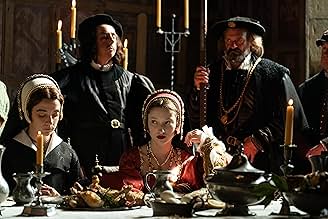Katherine Parr, the sixth wife of King Henry VIII, is named regent while the tyrant battles abroad. When the king returns, increasingly ill and paranoid, Katherine finds herself fighting for... Read allKatherine Parr, the sixth wife of King Henry VIII, is named regent while the tyrant battles abroad. When the king returns, increasingly ill and paranoid, Katherine finds herself fighting for her own survival.Katherine Parr, the sixth wife of King Henry VIII, is named regent while the tyrant battles abroad. When the king returns, increasingly ill and paranoid, Katherine finds herself fighting for her own survival.
- Awards
- 1 win & 2 nominations total
Linnea Martinsson
- Maud Lane
- (as Linnéa Martinsson)
Lisa Pyk
- Eleanor Browne
- (as Lisa Pyk Wirström)
Featured reviews
Alicia Vikander and Jude Law . The try of Karim Ainouz to explore the contribution of Katherine Parr to modelate last part of reign of her royal husband and the delicate balance between risks.
Motives to see this film, correct crafted, not always faithful to historical facts but working as honest sketch about a period and its challenges. And not bad resume of Henry VIII reign and the relation with his wives.
The only reproches - the feeling about soulness story, a presentation of venerable history teacher to his students after too many years of teaching. Second, the eccentric end and the impression about feminist manifesto.
But the costumes, rooms, relation of Katherine with the children of her king and the nice performances- Jude Law is, real, a good Henry VIII- are enough good points for appreciate this film.
Motives to see this film, correct crafted, not always faithful to historical facts but working as honest sketch about a period and its challenges. And not bad resume of Henry VIII reign and the relation with his wives.
The only reproches - the feeling about soulness story, a presentation of venerable history teacher to his students after too many years of teaching. Second, the eccentric end and the impression about feminist manifesto.
But the costumes, rooms, relation of Katherine with the children of her king and the nice performances- Jude Law is, real, a good Henry VIII- are enough good points for appreciate this film.
1500s-based "Firebrand" re-imagines the marriage of Katherine Parr (Alicia Vikander) to King Henry VIII (Jude Law) of England - when it was torn by religious division. As his sixth wife she tries steering him & his kingdom onto a liberal path, while treading a careful political line. Allies like Eddie Marsan help as they can, but the power of the church (represented by Simon Russell Beale) is against her. Performances are strong (esp Law & Beale), Karim Aïnouz's direction's solid, and the second screenplay from sisters Henrietta & Jessica Ashworth (aided here by Rosanne Flynn) is interesting & engaging. Feminist period dramas ain't for all, but this one isn't bad.
This beautifully shot and meticulously cut film is far better than the reviews suggest, and the performances are all first-rate.
I wasn't expecting the story to be in any way accurate - and I am fairly clued up on Henry the Eigth - and it isn't. But despite that the film works really well.
June Law is the BEST dipiction of an elderly, dying Henry VIII, I give his performance 10 stars.
The film is loosely tied to real events, with one exception and to that, later.
The setting in Haddon Hall, the building works perfectly, the Tudor period and its inhabitants were still quite medieval animals, with rare exceptions, and about 100 years behind their European contemporaries (see Chambord for example). Not until Charles I can England be described as having an emerging Renaissance culture. The clothes, head-dresses, jewellery, furniture are all deliciously vernacular, as is the Latin liturgy (which is helpfully translated using subtitles) as the setting is pre-Common Prayer - just).
So, the overrall flavour of Tudor Court life shown as a primitive and cruel place, given licence by a wilful, cruel and despotic king, is bang-on. The depiction of Elizabeth Parr's endurance of unspeakable treatment in a loveless, selfless marriage to an utterly unpredictable and boorish, selfish, old man - who also happens to be King and wields absolute power - quite justifies the finale which is THE ultimate wish fulfillment of all battered and abused wives everywhere!
Enjoy the film, and the less English history you know, the better it gets.
I wasn't expecting the story to be in any way accurate - and I am fairly clued up on Henry the Eigth - and it isn't. But despite that the film works really well.
June Law is the BEST dipiction of an elderly, dying Henry VIII, I give his performance 10 stars.
The film is loosely tied to real events, with one exception and to that, later.
The setting in Haddon Hall, the building works perfectly, the Tudor period and its inhabitants were still quite medieval animals, with rare exceptions, and about 100 years behind their European contemporaries (see Chambord for example). Not until Charles I can England be described as having an emerging Renaissance culture. The clothes, head-dresses, jewellery, furniture are all deliciously vernacular, as is the Latin liturgy (which is helpfully translated using subtitles) as the setting is pre-Common Prayer - just).
So, the overrall flavour of Tudor Court life shown as a primitive and cruel place, given licence by a wilful, cruel and despotic king, is bang-on. The depiction of Elizabeth Parr's endurance of unspeakable treatment in a loveless, selfless marriage to an utterly unpredictable and boorish, selfish, old man - who also happens to be King and wields absolute power - quite justifies the finale which is THE ultimate wish fulfillment of all battered and abused wives everywhere!
Enjoy the film, and the less English history you know, the better it gets.
I began watching the movie without reading anything about it but the people involved.
10 minutes in the film and I get the same claustrophobic feeling you get when you feel that everything around you hangs by a thread and every word could be a threat to your very existence.
Some people haven't lived with a psycho or a narcissist. Those who have would be quite quick to realise the portrait of Henry that Jude Law was going for. I watched the entirety of the film thinking about how narcissists exploit everyone around them, making them walk on eggshells constantly, belittling them with tough, stingy remarks that look like jokes while you know that they could become a flood hitting your face next. Henry's grip on everyone around him is proportional to the power he was wielding at that time, a king appointed by God who was questioned by no one. He has absolute power of everyone around him and he is expecting others to dance at his whim while he enjoys watching them squirm and twist to predict his uncontrollable fits of rage or loosing his favour.
Towards the end of the film I realised what psychologists speak about when they mention that a narcissist destroys many people around him and/or takes them down with him because he senses his end.
The whole story could have been an essay about women in the blood soaked Tudorian era trying to survive within the confounds of a male designed and controlled society. But, it was rather a portrait of a deranged fill with grandiose narcissist who thought others were his toys. Surely, ecclesiastical zealous and the reform and other subjects were touched, but with no particular strength or adequate given time to see them through.
Jude Law and Alicia Vicader were excellent in their roles. I would recommend the watch.
10 minutes in the film and I get the same claustrophobic feeling you get when you feel that everything around you hangs by a thread and every word could be a threat to your very existence.
Some people haven't lived with a psycho or a narcissist. Those who have would be quite quick to realise the portrait of Henry that Jude Law was going for. I watched the entirety of the film thinking about how narcissists exploit everyone around them, making them walk on eggshells constantly, belittling them with tough, stingy remarks that look like jokes while you know that they could become a flood hitting your face next. Henry's grip on everyone around him is proportional to the power he was wielding at that time, a king appointed by God who was questioned by no one. He has absolute power of everyone around him and he is expecting others to dance at his whim while he enjoys watching them squirm and twist to predict his uncontrollable fits of rage or loosing his favour.
Towards the end of the film I realised what psychologists speak about when they mention that a narcissist destroys many people around him and/or takes them down with him because he senses his end.
The whole story could have been an essay about women in the blood soaked Tudorian era trying to survive within the confounds of a male designed and controlled society. But, it was rather a portrait of a deranged fill with grandiose narcissist who thought others were his toys. Surely, ecclesiastical zealous and the reform and other subjects were touched, but with no particular strength or adequate given time to see them through.
Jude Law and Alicia Vicader were excellent in their roles. I would recommend the watch.
This film is set during the last days of Henry VIII (1546-7), with Jude Law as the King and Alicia Vikander as his sixth and last wife, Catherine Parr, who was also mother in all but name to the king's three children (only one of whom ever knew their actual mother).
The film starts with a caption which says (I forget the exact words) that there are always gaps in our knowledge of history, which we often fill with things we've made up. Well there aren't quite so many gaps as this film seems to suggest. The ending is entirely fictional, and there's at least one plot point that's total fabrication.
Does this matter, given that they were open with us? Probably not. Law is excellent as the sick, dying and paranoid king. Vikander is also excellent as the woman who must constantly tread a microscopically thin line between giving the king the support and affection he needs and becoming the third of his wives to be executed. Simon Russell Beale radiates oily menace as the odious Bishop Gardiner, and the rest of the ensemble cast do a good job in portraying a court torn between jockeying for advancement and fearful of provoking one of the king's irrational outbursts.
I do have one issue with the film: in an early scene we see Erin Doherty as Anne Askew the religious reformer (or radical, depending on your point of view) preaching to her followers in the woods. This is a dramatic and moving scene, and one hopes that Askew is going to feature prominently. She doesn't. Less than two minutes later we learn that Askew has been arrested, tortured and burned at the stake. We see nothing of this, which struck me as a missed opportunity.
That aside, we get a moving and dramatic film which skirts round the edge of actual history.
Oh; and if a King writes a song, of *course* the whole court will learn the words.
The film starts with a caption which says (I forget the exact words) that there are always gaps in our knowledge of history, which we often fill with things we've made up. Well there aren't quite so many gaps as this film seems to suggest. The ending is entirely fictional, and there's at least one plot point that's total fabrication.
Does this matter, given that they were open with us? Probably not. Law is excellent as the sick, dying and paranoid king. Vikander is also excellent as the woman who must constantly tread a microscopically thin line between giving the king the support and affection he needs and becoming the third of his wives to be executed. Simon Russell Beale radiates oily menace as the odious Bishop Gardiner, and the rest of the ensemble cast do a good job in portraying a court torn between jockeying for advancement and fearful of provoking one of the king's irrational outbursts.
I do have one issue with the film: in an early scene we see Erin Doherty as Anne Askew the religious reformer (or radical, depending on your point of view) preaching to her followers in the woods. This is a dramatic and moving scene, and one hopes that Askew is going to feature prominently. She doesn't. Less than two minutes later we learn that Askew has been arrested, tortured and burned at the stake. We see nothing of this, which struck me as a missed opportunity.
That aside, we get a moving and dramatic film which skirts round the edge of actual history.
Oh; and if a King writes a song, of *course* the whole court will learn the words.
Did you know
- GoofsKatherine Parr was not arrested in the presence of the king, nor was she dragged off to a dungeon. The warrant for her arrest was dropped, and found by a loyal servant, who brought it straight to her. Katherine completely lost her composure at seeing the king's signature on the document, and began to cry and scream. Henry heard her, and sent a servant to see what was the matter. When he found out, he sent word for her not to worry, and received her the next day. Katherine had learned her lesson; she was submissive and humble to Henry from then on, and he remanded her arrest warrant. Ultimately, her life was saved by his death.
- How long is Firebrand?Powered by Alexa
Details
- Release date
- Countries of origin
- Official sites
- Language
- Also known as
- La Reina De Fuego
- Filming locations
- Production companies
- See more company credits at IMDbPro
Box office
- Gross US & Canada
- $521,366
- Opening weekend US & Canada
- $233,373
- Jun 16, 2024
- Gross worldwide
- $4,520,641
- Runtime2 hours 1 minute
- Color
- Sound mix
- Aspect ratio
- 2.39 : 1
Contribute to this page
Suggest an edit or add missing content



































